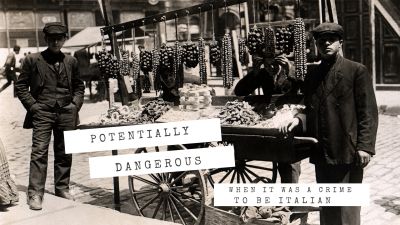It was once a crime to be Italian. That is what “Potentially Dangerous,” a documentary that explores a little-known era when Italian Americans were “Enemy Aliens” during WWII, reveals. As America crept closer to its second World War, the U.S. government grew suspicious of some citizens based not on what they had done, but only where they were from.
Six hundred thousand Italians and Italian Americans were persecuted during the war. Many were under curfew from 8 p.m. to 6 a.m. Ten thousand were forced from their homes and businesses. Hundreds were placed in military camps without trial. Their stories have gone untold. The impact has gone undetected. Until now.
“These events were traumatic,” says the film’s director, Zach Baliva. “Italians in America chose to forget their culture, and people in my generation feel the effects of that loss.” Baliva is a third-generation Italian who has lived and worked in both Hollywood and Italy. He hopes to revisit his great-grandfather’s hometown for the first time as part of “Potentially Dangerous.” He has already interviewed several people including a 91-year-old man who remembers the night the police raided his home and confiscated his father’s radio. They had to register as Enemy Aliens and abandon a well-established family business.
“When I connect with these people, I can hear in their voices what it meant to their families, and how it changed them,” Baliva says. “And also, that double-effect of not having it known. And it doesn't have to be hidden anymore. We need to tell this story now while we still can.”
“Potentially Dangerous” is part of the Russo Brothers Italian American Film Forum, an annual event created by Hollywood directors Joe and Anthony Russo in partnership with the National Italian American Foundation and the Italian Sons and Daughters of America to support projects that highlight the Italian American experience.
Director Zach Baliva started his career on the hit NBC show “ER” at Warner Bros. and later produced “My Name is Jerry,” the independent film that gave this year's Academy Award Nominee Steven Yeun (Minari) his first on-screen role. Recently, Zach spent time with La Gazzetta to give us some insight into his project.
La Gazzetta (LG): Zach, we are very excited about your project and our readers will be too. Where in Italy is your family from?
Zach Baliva (ZB): My great-grandfather’s family is from Abruzzo, specifically the town of Penne near Pescara. My grandfather is from Celano. During my dual citizenship process, Penne became my commune although it was easier to travel to Celano.
LG: You have come across a relatively little-known piece of Italian American culture.
ZB: I was at a film forum where someone introduced me to the history of these Italian enemy aliens. I was immediately enthralled. These people were detained at Ellis Island. That is such a juxtaposition! When people think of Ellis Island they think of hope. That is not the case here.
I am endlessly curious of how there is this chapter of Italian American history I did not know, and others do not know. It is the perfect story for someone with my background. I now own the importance of getting this story out there because it is an unknown story of collective trauma that changed Italian American culture.
LG: Why is this story so important to the Italian American culture?
ZB: During this time, Italian immigrants needed to demonstrate their loyalty to the U.S. In doing so, they chose to ignore their Italian roots, not for lack of pride but for fear of safety. Many immigrants were likely exploited under harsh conditions. And many shown sacrifice and heroism during these war time events. Italian Americans suffered through traumas and chose not to pass down their culture for their own safety. My goal is to recover some of this lost culture. I want to show how we connect back to this history.
These events made a lasting impact on these immigrant families, even though they may have only lasted a few terrible months. Giving these people the opportunity to tell their story before it is too late is a true gift.
LG: How are you finding your interview subjects?
ZB: That is our biggest challenge. Time is of the essence. This happened 80 years ago. People who witnessed these events first-hand are passing away. To be honest, the list of interviewees was longer when we started so we are moving as quickly as we can. Historians are a great help, but the first-hand accounts are much more impactful. This is our last chance to tell this story.
LG: How long do you think the project will take to complete?
ZB: Typically, I would say 12-18 months for this grassroots independent film to be made. Our small yet mighty team will do it in less time. Our deadline is September 1 of this year. We just completed a successful Kickstarter campaign – thank you to all who donated! There is an urgency of wanting to tell the story now because, as I have mentioned, our interviewees are 91-years-old and healthy right now.
We are very grateful to the prestigious Russo Brothers Film Forum and our Kickstarter supporters for making this journey possible. Production started in June, and we are well on our way to bringing “Potentially Dangerous” to you!
Follow Potentially Dangerous on all social media platforms to stay up-to-date!
https://www.lagazzettaitaliana.com/entertainment/9750-potentially-dangerous-when-it-was-a-crime-to-be-italian#sigProId8f8083326e




